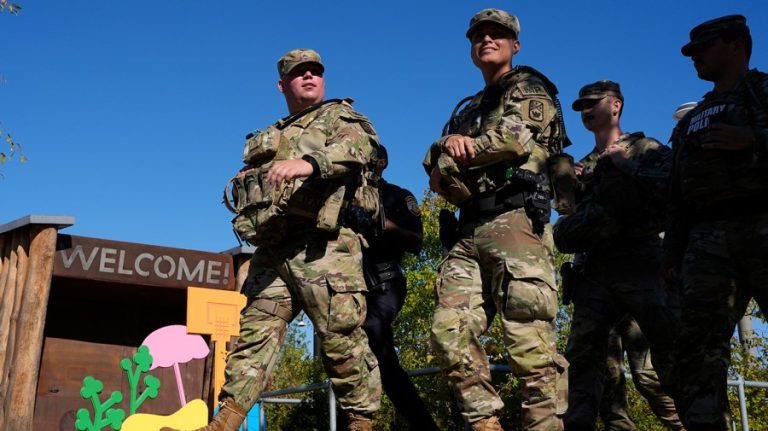Time is running out to find the next solution to get service members paid during the government shutdown, as the $8 billion the Trump administration found to cover troops’ paychecks is due to run out at the end of the month.
After Senate Democrats on Thursday sank a vote on Sen. Ron Johnson’s (R-Wis.) bill to pay active-duty military personnel and federal employees required to work during the shutdown, troops, sailors and Air Force members may not receive their Oct. 31 paycheck.
Now, with the shutdown into its fourth week and no end in sight, the administration will need to figure out where to pull additional funds from if it wants its forces to be paid, should Congress fail to come up with a solution in time.
Trump says friend cut $130M check for military amid shutdown
“While I am grateful President Trump paid service members thus far, I am concerned that money will run out by the end of October and our military won’t get paid on time,” said Rep. Jen Kiggans (R-Va.), a former Navy helicopter pilot who last month introduced a stand-alone military pay bill, the Pay Our Troops Act. The bill has made little movement.
Trump on Oct. 11 directed Defense Secretary Pete Hegseth to pay service members’ midmonth paychecks by using $8 billion in previously appropriated Pentagon funds meant for research, development, test and evaluation (RDT&E).
But that pay cycle cost roughly $6.5 billion, leaving only $1.5 billion leftover for the looming Oct. 31 payday, which is expected to cost $6 billion to $7 billion, according to Todd Harrison, a senior fellow at the American Enterprise Institute.
“My understanding is that the initial money pulled from the RDT&E account was only sufficient to cover the Oct. 15th payroll,” he told The Hill.
Harrison said there are plenty of other accounts with carryover funding from previous years that Pentagon leadership can tap to keep the pay flowing for months, but at the end of the day, “they are just robbing Peter to (literally) pay Paul,” he said. “Once funding is restored, they will need to move this money back into the accounts it came from.”
The Pentagon did not respond to a request for comment from The Hill as to whether officials have identified any other payroll sources.
SNAP funding expiration set to hit 40 million people
The upcoming deadline appears to have lawmakers on both sides of the aisle worried, after senators voted 54-45 against advancing legislation from Johnson that would have guaranteed pay for essential federal workers, including members of the military, during the government shutdown.
Georgia’s Democratic Sens. Jon Ossoff and Raphael Warnock joined Sen. John Fetterman (D-Pa.) in breaking ranks in voting for the Republican bill, known as the Shutdown Fairness Act, which needed 60 votes to move forward.
Though federal employees are guaranteed back pay once the government reopens, the bill would have given some relief to federal workers going without pay before that happens.
But Democrats — who have held firm in demanding that Republicans extend soon-to-expire Affordable Care Act subsidies and negotiate an end to the shutdown with them — saw the bill as extending the shutdown by taking pressure off Republicans to negotiate.
Senate Democratic Leader Chuck Schumer (N.Y.) on Thursday called Johnson’s bill “a ruse,” warning it would give the White House too much power to determine which federal workers get paid and which remain furloughed.
“We will not give Donald Trump a license to play politics with people’s livelihoods,” Schumer said.
Democrats instead wanted a bill from Sen. Chris Van Hollen (D-Md.), which would pay all federal workers during the shutdown. That legislation also was blocked Thursday.
Trump administration threatens no back pay for federal workers in shutdown
“Republicans are hell-bent on letting Trump pick winners and losers here, but every federal worker, servicemember, and federal contractor deserves to get paid,” Van Hollen said in a statement.
Sen. Richard Blumenthal (D-Conn.) told reporters that he voted down Johnson’s bill as “we should pay all of our essential workers, not just our military, but also ICE and TSA and air controllers without the president picking and choosing his favorites.”
Making matters more tricky, the Senate is set to leave town Thursday afternoon until Monday, and Trump has embarked on a multiday trip to Asia.
Asked if Republicans have an alternative if the troops are not paid by Oct. 31, Johnson told reporters that Trump “only has so much latitude” in pulling funding from other areas as he did earlier this month.
“There’s only so many pots of money that he has the authority,” he told reporters. “He’s not a king, you know, he only has so much authority.”
He added: “My guess is those pots of money are going to be running out here, which is why, you know, this is important, so we’ll see.”
The latest action comes after Senate Majority Leader John Thune (R-S.D.) last week tried to move ahead on a stand-alone Defense Department funding bill, but that was blocked by the Democrats.
Looking ahead, Republicans next week could try to force a vote on pay for military members, air traffic controllers and Transportation Security Administration employees, as well as funding for key nutrition benefits such as those under the Supplemental Nutrition Assistance Program before they’re cut off on Nov. 1.

